|
|
|
Sort Order |
|
|
|
Items / Page
|
|
|
|
|
|
|
| Srl | Item |
| 1 |
ID:
120229


|
|
|
|
|
| Publication |
2013.
|
| Summary/Abstract |
In studying the policy responses to economic crises in ASEAN and the EU, this paper addresses three issues: the financial crisis of 1997-98 in Southeast Asia, and the European Union's financial crisis of 2008 followed by the sovereign debt crisis; policy adjustment actions in both regions in the area of economic coordination; and areas of mutual policy inspiration for both regions.
Both crises studied were regionally risk-intensive. However, their natures were different. The Asian crisis was mainly externally driven by capital flows, while the EU one - especially the sovereign debt part of it - was predominantly of an internal nature due to imbalances in the euro area and a worsening of the situation in public finances in some euro members. On top of it, the pre-crisis economic governance structure differed with a light one in ASEAN and a deeper one in the EU; however, economic policy was still based dominantly on coordination.
The policy adjustment corresponds to the nature of the crisis and original governance structures. In ASEAN, it is characterized somewhat both by a deepening of regional cooperation and a widening of risk-pooling beyond the borders of the region (ASEAN Plus). On the EU side, the policy response privileges a strong deepening of policy cooperation coupled with more narrow-looking geographical coverage.
The crises offer a unique window for policy adjustment. ASEAN could consider: deepening multi-lateralization in the single market; a gradual and low-intensity monetary cooperation; and enhancing its institutional capacity. The EU can, on its side, fully implement its new rules and put them under the EU-27 roof. It can go beyond this and consider a broader economic partnership with some of the new instruments with the EFTA countries. Finally, it can also reflect on the ASEAN success with the enlargement of its regional influence - how to strengthen its leadership in its closest neighbourhood (Balkans, North Africa, Eastern Partnership) by ensuring an area of stability and prosperity.
|
|
|
|
|
|
|
|
|
|
|
|
|
|
|
|
| 2 |
ID:
176124
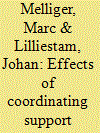

|
|
|
|
|
| Summary/Abstract |
The economic context for renewable power in Europe is shifting: feed-in tariffs are replaced by auctioned premiums as the main support schemes. As renewables approach competitiveness, political pressure mounts to phase out support, whereas some other actors perceive a need for continued fixed-price support. We investigate how the phase-out of support or the reintroduction of feed-in tariffs would affect investors’ choices for renewables through a conjoint analysis. In particular, we analyse the impact of coordination – the simultaneousness – of policy changes across countries and technologies. We find that investment choices are not strongly affected if policy changes are coordinated and returns unaffected. However, if policy changes are uncoordinated, investments shift to still supported – less mature and costlier – technologies or countries where support remains or is reintroduced. This shift is particularly strong for large investors and could potentially skew the European power mix towards an over-reliance on a single, less mature technology or specific generation region, resulting in a more expensive power system. If European countries want to change their renewable power support policies, and especially if they phase out support and expose renewables to market competition, it is important that they coordinate their actions.
|
|
|
|
|
|
|
|
|
|
|
|
|
|
|
|
| 3 |
ID:
161730
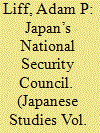

|
|
|
|
|
| Summary/Abstract |
In 2013, Japan established its first-ever National Security Council (NSC) as the leading edge of ambitious reforms to its foreign-policy-relevant institutions. Within weeks, Japan’s new national security tripod was firmly in place: the top-level, political NSC ‘control tower’ as well as Japan’s first-ever National Security Strategy and National Security Secretariat. Ever since, the NSC has played a central role in every major aspect of the Japanese strategic trajectory that has attracted so much global attention (and controversy) in the ‘Abe era’. This study analyzes the motivations driving Japan’s decision to establish an NSC, the institution’s key characteristics and functioning, and offers a preliminary assessment of the current and likely future implications of this historic institutional reform. Beyond the NSC’s impact on policy, of potentially greater long-term significance is its effects on Japan’s foreign-policy decision-making processes: in particular, expanded Kantei-centered political leadership of national security affairs and more ‘whole-of-government’ approaches specifically designed to transcend the ‘vertical hurdles’ traditionally dividing Japan’s powerful bureaucracies. The goal of these reforms is as straightforward as it is ambitious: to transform Japan’s ability to flexibly and independently cope with a rapidly changing, increasingly complex, and ever more uncertain security environment in East Asia and beyond.
|
|
|
|
|
|
|
|
|
|
|
|
|
|
|
|
| 4 |
ID:
111525
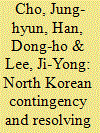

|
|
|
| 5 |
ID:
153251
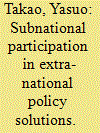

|
|
|
|
|
| Summary/Abstract |
The growing challenges of environment and sustainable development stretch across scales of geographic space and require action at multiple levels of jurisdictions, such as individual level, community level, national level, and global level. Multilevel governance and cross-scale coordination will open up opportunities for a variety of stakeholders to participate in decision-making. While potentially increasing the capacity of governance, the cross-scale and multilevel approaches may face a difficulty in policy coordination created by the plurality of stakeholders and be attended with organizational complexity. This article will examine the potential of subnational participation to make a policy choice, mediated by local governments, to be congruent with global strategies and national mandates in a consistent way. To this end, it will bring a new perspective to Kitakyushu City's experience in Japan as a heuristic test case study. My claim is that subnational actors occupy a strategic position to straddle the division between state and society, between the center and the periphery, and between the domestic and the foreign so they can act as an intermediate agent in reconnecting local action with national policy and turning global strategies into local action for problem solving.
|
|
|
|
|
|
|
|
|
|
|
|
|
|
|
|
| 6 |
ID:
140475
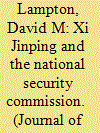

|
|
|
|
|
| Summary/Abstract |
This article discusses the rationale for, and progress to date of, creating a National Security Commission in China, a move first announced in late 2013. Central impulses for the Commission's establishment are to help better coordinate a very fragmented bureaucracy and to advance Xi Jinping's drive to consolidate his personal power over the internal and external coercive and diplomatic arms of the governing structure. The Commission is a work in progress and its full institutional maturation will take a protracted period. In the midst of the Commission's construction, there is considerable confusion among subordinates in the foreign policy and security areas about lines of authority and ultimate objectives. Beyond Xi Jinping, it is difficult to discern an authoritative voice. It is an open question as to whether this institutional attempt to achieve coordination will improve, or further complicate, China's long-standing coordination problem, some recent foreign policy achievements notwithstanding. The Commission's focus is heavily weighted toward internal and periphery security, but it also is an institution-building response to new global and transnational issues. It is not self-evident that Xi, or any single individual, can effectively manage the span of control he is constructing.
|
|
|
|
|
|
|
|
|
|
|
|
|
|
|
|
|
|
|
|
|